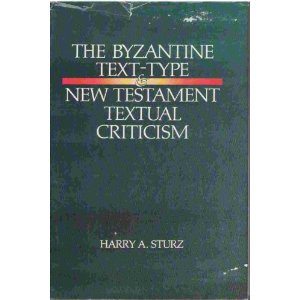|
restoring our biblical and constitutional foundations
|
Harry Sturz: New Testament Textual Critic
Most people know that my views about New Testament textual criticism have been greatly influenced by my former colleague in the Greek Department at Biola University, Prof. Harry Sturz. Sturz's dissertation (Th.D. Grace Theological Seminary) was published as The Byzantine Text-Type and New Testament Textual Criticism.

It is masterful work. It was written by a scholar for scholars. And it's a reminder of just how unpredictable scholarship can be at times. Just when the coaches thought they had their players set up for an off-tackle thrust, someone seizes the ball and carries it on a wide sweep around end. This is precisely what happened when Harry Sturz published his book.
In textual criticism, one enters a discipline that is as much art as it is science, so that what is all too clear to one scholar may be opaque to another. My friend Dan Wallace -- who, incidentally, also took Harry Sturz's textual criticism class at Biola -- has explained how he left the Sturzian fold and returned to the camp of the Critical Text -- much to the joy, I surmise, of the coaching staff.
I have never changed my mind.
Harry Sturz had no personal axe to grind. He neither hoped for nor expected any professional advantages from his work on the Byzantine text. He had been a student of E. C. Colwell when the latter was still teaching at Claremont Graduate School in Southern California. Like Colwell, Sturz always presented his views in a scholarly yet humble way. His work was not a revelation from Mount Sinai but the considered judgment of an intelligent, hardworking scholar.
Much to his credit, Sturz had the temerity to challenge the status quo and to take up the cudgels of the primary data in search of the truth. His views were (and still are) diametrically opposed to the conception behind the Byzantine Priority view and the Critical Text view alike. With the grim determination of a spawning salmon, he swam up the stream of scholarship. His total sincerity shows through every page of his work. His reputation at Biola was such as to compel respect and attention by all. His conclusion -- that the Byzantine text is not edited or secondary in the Westcott-Hort sense -- gushed forth from the fountains of his conviction.
I consider The Byzantine Text-Type and New Testament Textual Criticism to be extremely fair with the evidence, and whenever I teach textual criticism I always require it to be read alongside other standard works in the field. Sturz's perspective is, I believe, absolutely essential to a correct estimation of the problem. This is all the more important in our day, which is characterized by a burgeoning ambivalence toward all things text-critical. It is the duty of every student of the New Testament to dig up the skeleton of truth, even if only a dozen people in the world care about it.
Harry Sturz was a gentleman to his fingertips. He would never have thought of imposing his ideas upon his students, who held him in awe. He was a beaver for work despite his age. Unlike so many scholars of his day (and ours), he refused to resort to the ark of group-think, scampering up its gang plank whenever his views were challenged.
Harry Sturz's The Byzantine Text-Type and New Testament Textual Criticism is a magnificent tour de force. In my opinion, it seriously weakens the arguments of both those who elevate the Byzantine text to a position of unquestioned primacy and those who seek to relegate it to the academic rubbish heap. All in all, it pulls the rug from under a great deal of what passes for scholarship today. It is a dangerous book for a young scholar to read, unless one enjoys coolheaded, impersonal logic. It is a coda to an investigative symphony, and for the symphony I am most grateful, even though it remains unfinished.
November 20, 2010
David Alan Black is the editor of www.daveblackonline.com.